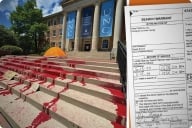You have /5 articles left.
Sign up for a free account or log in.
In what may be a new (and is certainly an unintended) use of the U.S. News & World Report rankings, Christopher Newport University is using them, in part, to hire faculty members.
Under a policy instituted by the provost, Mark W. Padilla, the university is considering whether new faculty hires meet certain criteria. (How much consideration is a point of dispute, with Padilla saying that the university will give "strong consideration" to these qualifications while some faculty believe that these are absolute requirements). Favored candidates should meet at least one of the following criteria:
- An undergraduate degree from one of the top 99 national liberal arts colleges or the top 35 national universities in the U.S. News rankings.
- A terminal degree from one of the 69 best national universities in the U.S. News rankings.
- A terminal degree from a doctoral program ranked in the top 35 percent of National Research Council rankings.
- Election to Phi Beta Kappa.
To varying degrees, some departments at many colleges and universities have historically favored hiring candidates with doctorates in highly ranked graduate departments, but those judgments have generally been based on departmental reputations for graduate instruction, not U.S. News rankings. U.S. News has never promoted its rankings as a tool to use in hiring faculty, and Robert Morse, who directs the rankings for the magazine, said he had not heard of them being used in this way.
It may also be difficult to use the National Research Council rankings in this way. The new methodology for the NRC rankings does not feature a top 35 percent, or a top anything, but rather broad ranges in which programs may fall, and so most programs that might be in the top 35 percent might also be well below that. (A spokeswoman for Christopher Newport, asked how the university could get a top 35 percent out of the NRC methodology, said: "The university administration is aware of the new methodology and has factored these changes into its approach to hiring faculty. The administration looks for Ph.D.s in the top 65 percent of the ranked schools." She could not explain how the university can do that, given that the NRC has eliminated all ordinal rankings, so that there also is not a top 65 percent, although she did say that the provost had indicated that the university uses the "S" rating, one of two on which the NRC provided broad ranges of scores.)
Inside Higher Ed learned of the use of the system from someone who had heard from several job candidates who were distressed to find out that they had little chance of being hired at the university because they had graduated from institutions not deemed prestigious enough for Christopher Newport (which U.S. News does not rank because it is considered a "tier 2" institution).
The system was developed in the provost's office, and the provost would make the cut for a faculty hire based on these criteria; he is a Princeton University Ph.D., and Princeton is always among the top national universities in U.S. News.
It is less clear, however, whether the president at Christopher Newport would make the cut. Paul S. Trible Jr. (a former U.S. senator) holds a bachelor's degree from Hampden-Sydney College (the No. 111 liberal arts college, according to U.S. News) and his terminal degree is a J.D. from Washington & Lee University, which ranks highly (No. 14) as a liberal arts college but is not considered a national university to qualify under Christopher Newport standards.
A spokeswoman for Christopher Newport, however, said that Trible would qualify because Washington & Lee's law school is tied for 34th in this year's U.S. News rankings of law schools and so that would count. But asked why this exemption wasn't listed with other criteria, she said she didn't know. (Trible was not elected to Phi Beta Kappa, so he would not qualify that way.)
Via e-mail, Padilla said that since Christopher Newport has become more competitive itself in recent years, it needs to consider rankings of the institutions attended by prospective faculty members. "The university has sought -- and continues to seek -- new faculty members who are committed to excellent teaching at the undergraduate level, and to producing outstanding cutting-edge research and scholarship," he said. "In assessing which candidate to hire, the university considers the reputation of each candidate's doctoral program as reflected by the various rankings of programs. In the university's experience, candidates from programs that are highly ranked are more likely to meet the needs of our students and the objectives of the university."
While Padilla said that "candidates who have not attended a highly ranked program are unlikely to be hired," he said that exceptions are made. And he said that once candidates are over that bar of the rankings criteria he set, differences in how highly ranked their programs are "will be of little relevance" in hiring decisions.
Peter M. Carlson, chair of the Faculty Senate and professor of government at Christopher Newport, received his doctorate from the University of Southern California (which, by virtue of its U.S. News ranking of 23rd, would qualify him for being hired). Carlson said that he has mixed feelings about the new system.
"I would support and do support the hiring of the very best people we can get, and I think that would be just common sense," he said. But he added that "I haven't had to deal with the obvious negatives, which is people who would be applying who wouldn't rank high enough" but who are worthy of being hired. He said he has heard from some chairs that "sometimes they have candidates that they want to hire" but can't because of the ratings of their various alma maters.
Asked if the faculty had been involved in developing the new policy for faculty hiring, Carlson said "we were not."








